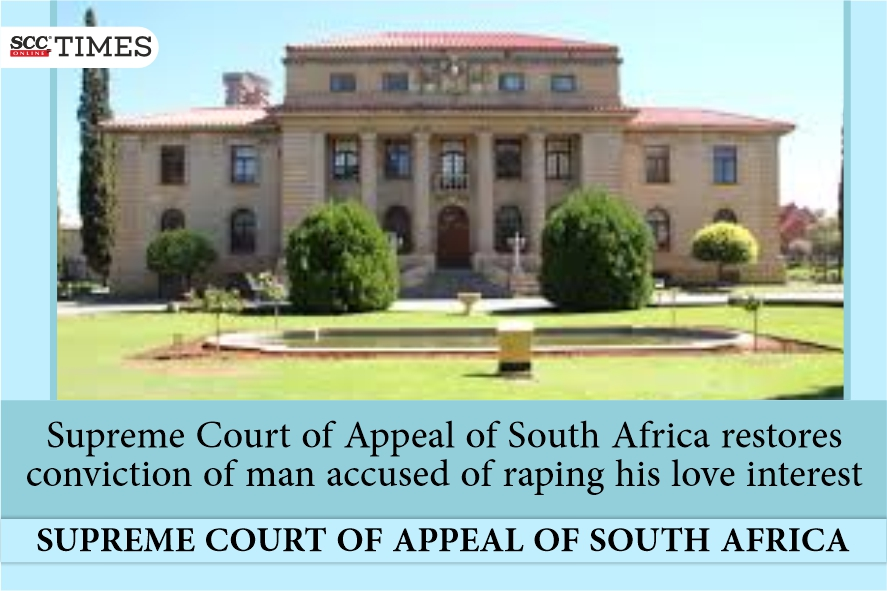Supreme Court of Appeal of South Africa: In an appeal before the Supreme Court of Appeal, by the Director of Public Prosecutions, Eastern Cape, Makhanda, against an order of acquittal passed by the High Court for a man convicted for raping his romantic interest, the bench comprising of XM Petse, DP, and NP Mabindla-Boqwana, J.*, reversed the decision of the High Court, and reinstated the conviction of the accused.
The Court noted that the instant case falls within the category of sexual violence committed in the context of an intimate relationship which can be difficult to navigate. The Court emphasized that that consent by one party to a specific form of sexual act should not be taken to be a license to every other sexual act, and the Sexual Offences Act was designed to address situations such as these.
Background
The convict and the complainant were in a romantic relationship, when the latter (21 years old at the time) had discussed with the convict that she was a virgin and wished to preserve her virginity. On the day of the incident, she had visited the convict’s apartment to spend the night and had made it plain that her visit would not in any way signify that they would engage in penetrative sex, to which end, the convict assured her. The couple consensually engaged themselves in foreplay, until the convict started having penile intercourse with the complainant, to which she protested but the convict did not stop.
The convict was charged with committing rape of the complainant, and he pleaded not guilty to the charge, asserting that the sexual intercourse was consensual.
The Regional Magistrate found the convict guilty beyond reasonable doubt. The convict thereafter applied for leave to appeal against his conviction and sentence before the Eastern Cape Division of the High Court, Makhanda, where he was granted leave, and acquitted. The High Court held that consent to a sexual penetration act can be granted either explicitly verbally, or tacitly by conduct, and found that the complainant was an active participant due to non-objection to the activities that preceded the penetration. The State therefore preferred the instant appeal against the acquittal of the convict.
The appeal concerned the interpretation and approach adopted by the High Court to two crucial elements of the statutory crime of rape- the nature of consent to a sexual penetrative act, and the form of intention required for conviction.
Decision of the Court
Perusing the High Court’s decision, the Court said that an Appellate Court should be guided by the well-settled principle that its powers to interfere with the findings of the Trial Court are circumscribed, therefore, it should not interfere with those findings unless satisfied that the Trial Court committed material misdirection or a demonstrable blunder in evaluating the evidence.
Upon the matter of consent, the Court held that the Sexual Offences Act explicitly requires that consent must be ‘given consciously and voluntarily, either expressly or tacitly by persons who have the mental capacity to appreciate the nature of the act consented to’, and stated that in light of Section 3 of Sexual Offences Act, ‘ an act of sexual penetration’ meant that one party must agree to engage in a particular act of sexual penetration with another.- To illustrate, the Court referred to the facts of the instant case and pointed out that the consent to foreplay or oral sex will not suffice for purposes of a vaginal penetrative sexual act because foreplay and oral sex do not constitute an ‘act of penetration’.
Regarding the mens rea behind the commission of the offence, the Court found some factors emanating from the facts presented by both parties concluded that the convict intentionally had penetrative sex with the complainant non-consensually.
About the conspectus of evidence, the Court held that commission of rape stood proven beyond a reasonable doubt, and therefore, the High Court’s interference with the findings of the Trial Court was unwarranted. Finally, the Court reinstated the conviction and found the High Court had committed an error of law.
Lastly, concerning the sentence imposed on the convict, the matter was remitted to the High Court to determine whether sentence imposed by the Regional Court was appropriate.
[Director of Public Prosecutions, Eastern Cape, Makhanda v Coko [2024] ZASCA 59, Order dated: 24-04-2024]
*Judgment by XM Petse, Deputy President, Supreme Court of Appeal, and NP Mabindla-Boqwana, Judge of Appeal
Advocates who appeared in this case :
Advocates for the Appellant: J Mnisi, with P Pillay
Advocates for the Respondents: KF Pieterse
Amici curiae: B Pithey, L Makapela, G Marcus SC, E Webber






